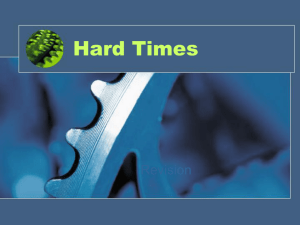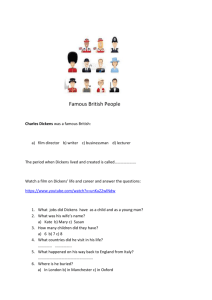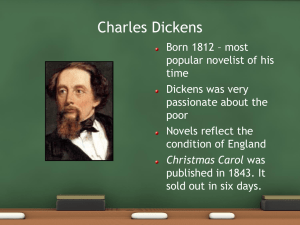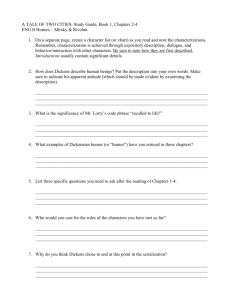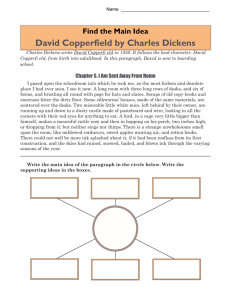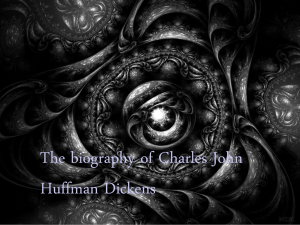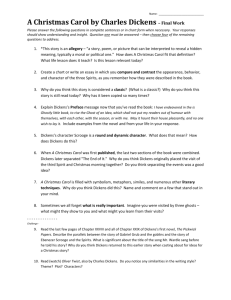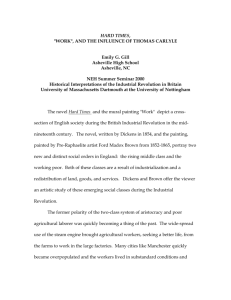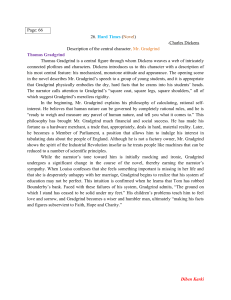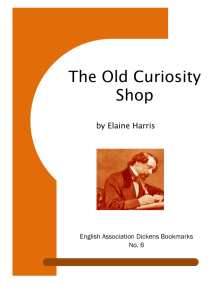Celebrating Charles Dickens: our contemporary
advertisement
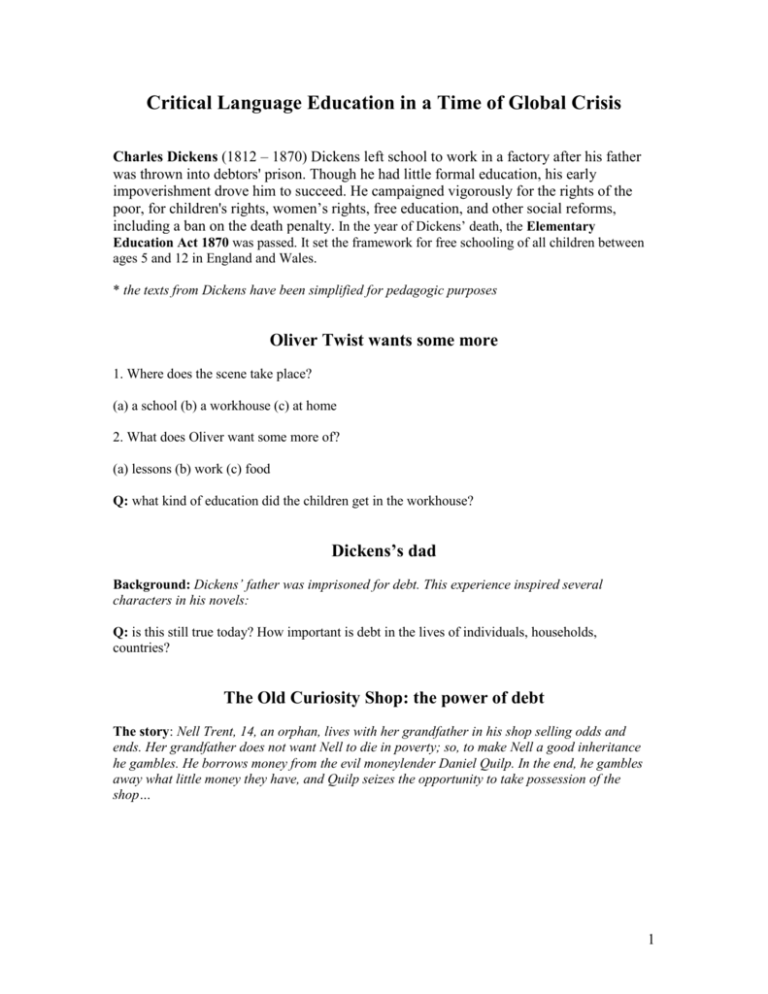
Critical Language Education in a Time of Global Crisis Charles Dickens (1812 – 1870) Dickens left school to work in a factory after his father was thrown into debtors' prison. Though he had little formal education, his early impoverishment drove him to succeed. He campaigned vigorously for the rights of the poor, for children's rights, women’s rights, free education, and other social reforms, including a ban on the death penalty. In the year of Dickens’ death, the Elementary Education Act 1870 was passed. It set the framework for free schooling of all children between ages 5 and 12 in England and Wales. * the texts from Dickens have been simplified for pedagogic purposes Oliver Twist wants some more 1. Where does the scene take place? (a) a school (b) a workhouse (c) at home 2. What does Oliver want some more of? (a) lessons (b) work (c) food Q: what kind of education did the children get in the workhouse? Dickens’s dad Background: Dickens’ father was imprisoned for debt. This experience inspired several characters in his novels: Q: is this still true today? How important is debt in the lives of individuals, households, countries? The Old Curiosity Shop: the power of debt The story: Nell Trent, 14, an orphan, lives with her grandfather in his shop selling odds and ends. Her grandfather does not want Nell to die in poverty; so, to make Nell a good inheritance he gambles. He borrows money from the evil moneylender Daniel Quilp. In the end, he gambles away what little money they have, and Quilp seizes the opportunity to take possession of the shop… 1 Fill in the gaps with the words given and then practise the dialogue below the with a partner: debts interest loan investments property Quilp: Here, sign Grandfather: What is this? Quilp: Read. Grandfather: It’s an agreement; it says I must hand over the shop to you! Quilp: Correct. This is the last money I will give you. And I’ll make this (1)_______on the understanding that you will pay me back for everything – but with my (2)__________doubled or even trebled. Should you fail to do so, the shop legally becomes mine. . Grandfather: Everything I own becomes yours? Quilp: All your (3)_________. Grandfather: The Old Curiosity Shop? Why do you ask me to sign such a document now? Haven’t I always paid you back? Quilp: Your (4)_________ are getting bigger and bigger; and I need some kind of guarantee. Grandfather: I will not do it, Quilp. Everything I own is for Nell’s future. Quilp: Very well, then; you have deceived me; you assured me you would treble and quadruple my loans by the (5)_________ you paid me; there’s nothing more to say… Q: (1) In what ways do moneylenders affect our lives today? (2) What might the ‘Old Curiosity Shop’ symbolize today? (3) Who could little Nell symbolize today? Lesson Observation 1: David’s new school Plot: Little David meets his new teacher, Mr Creakle, the head of Salem House school. 1. What is the classroom like? 2. What does the placard say? 3. What is David afraid of? Q: How does Mr. Creakle’s school violate Maslow’s hierarchy of needs? Lesson Observation 2: Hard Times The story: Mr Gradgrind runs a school in Coketown, an industrial town in the north of England. .He is explaining his educational principles to an assistant teacher. Sissy Jupe works in a circus with her father, who trains horses. Bitzer is another pupil. A good pupil. Before you listen: write your definition of a horse: _________________________________. 2 1 Mr Gradgrind’s teaching method is based on (a) scientific information (b) imagination (c) using pictures 2 Gradgrind tells Sissy she must not (a) paint (b) play (c) fancy Q: Are schools today in any way like that in Hard Times? Hard Times: Mr Bounderby The story: Mr Bounderby, a rich banker and mill owner, is a friend of Mr Gradgrind, the school owner and politician. Bounderby is the man Gradgrind would like his daughter to marry. In this scene, he remembers his childhood. 1. Mr Bounderby says he was born in a (a) cottage (b) bank (c) ditch 2. As a baby, Mr Bounderby says he slept in (a) an egg-box (b) a cot (c) a bed 3. What’s Bounderby’s opinion of the workers in his factory? They are (a) healthy (b) well-paid (c) well-fed Q: What is the reputation of bankers today? Why? Hard Times: Louisa’s Voice Fill in the gaps: What do I know, father, of tastes and (1) _____; of aspirations and affections. I never had a child’s heart. You have trained me so well, that I never dreamed a child’s dream. What have you done, with the garden that should have bloomed once, in this great wilderness here! If you had known that there was in my breast, sensibilities and (2)_______ which defy all the arithmetic ever made by man,— would you have given me to the husband whom I am now sure that I hate? Would you have robbed me of the spring and summer of my belief, my refuge from what is sordid and bad in the real things around me? If I had been free to exercise my (3)________ I should have been a million times wiser, happier, more loving, more contented, more innocent and human than I am now. 3 Further Reading Collins, Phillip 1963. Dickens and Education (Macmillan) Hartely, Jenny. 2008. Charles Dickens and the House of Fallen Women. (Methuen) Hughes, James 1901. Dickens as an Educator (Elibron Classics) Manning. John 1959. Dickens on Education (University of Toronto Press) Maslow, Abraham. 1954. Motivation and Personality (Harper) Pryce, V. 2012. Greekonomics. (Biteback Publishing) Tomalin, Claire 2011. Charles Dickens: a life (Penguin) Tomalin, Claire 1991. The Invisible Woman (Penguin) References On Malala Yousafzai: http://www.independent.co.uk/news/world/asia/shot-by-the-taliban-the-14yearoldcampaigner-riding-the-school-bus-8204461.html On inequality today and a return to the bad old Victorian age: http://www.oxfam.org/sites/www.oxfam.org/files/cost-of-inequality-oxfammb180113.pdf On Human Trafficking http://thenoproject.org/english/ On Dave’n’Luke Theatre for ELT http://davenluke.wordpress.com/ Luke Prodromou lukep@otenet.gr David Gibson dggib@hotmail.com 4

